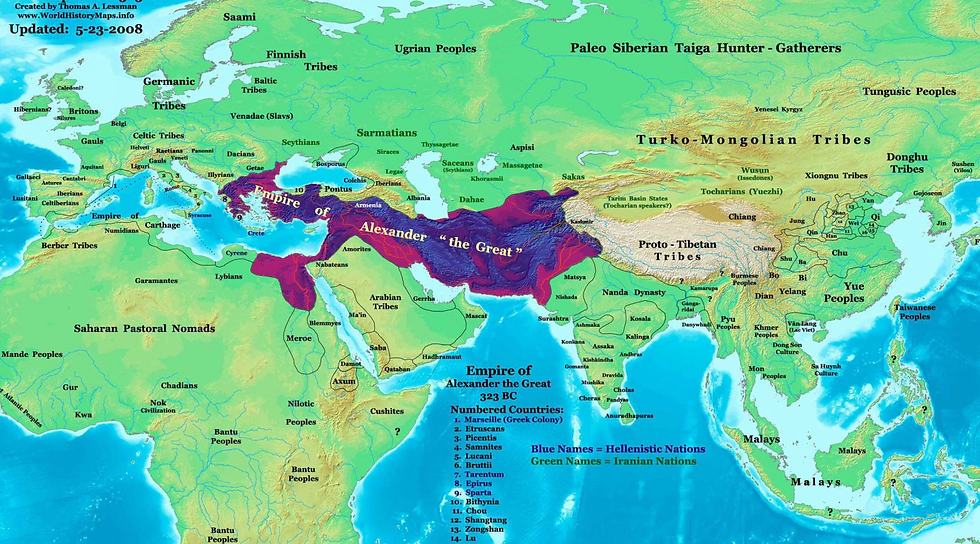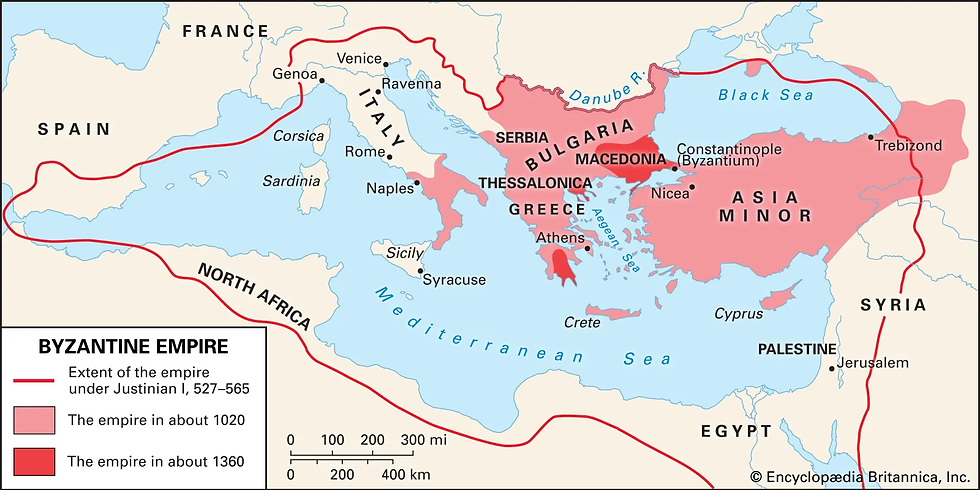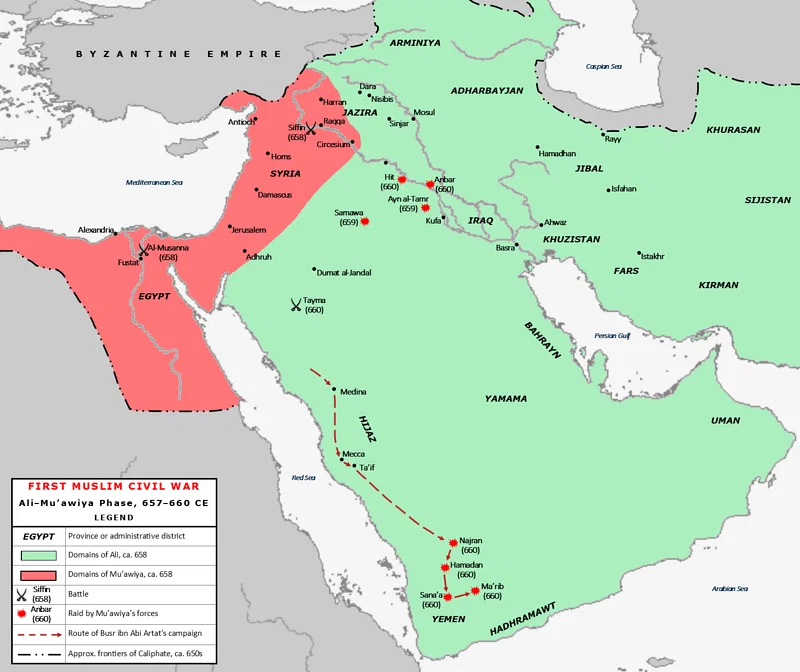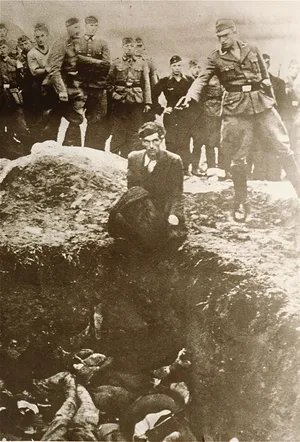Jews' fight for Survival ( யூதர்களின் வாழ்க்கைப் போராட்டம்)
- rajamohansub
- Nov 8, 2023
- 11 min read

The Menorah ( seven - branched candelabrum)
Recent developments in the Middle East made me sit up and take notice and to find out why this region (the Middle East, the birth place of Judaism, Christianity and Islam ) is always in turmoil and under the influence of violence.
Having spent most of my professional life in that region, i am not a stranger to the turbulent Middle Eastern politics ( having lived through war sirens, missiles overflowing the building and landing into the sea, sealing the house for lethal gas attack and the possible evacuation to anti gas chamber ) , but the latest developments enthused me to search the root cause, history, slavery, exodus, invasions, persecutions, pogroms, expulsions, confiscation of wealth & properties and holocaust of this conflict.
Capturing the very complex situations, concise, with out missing any significant developments, spanning many centuries, over many continents and many kingdoms & empires is a challenge and I strived to balance this, in this blog, and present before you to have your own judgement.
1.Early history of the land of Canaan:
The history of the region of the Middle East is rooted in the complex history and demographics of the region. In the ancient times, Jews lived in the region of the Middle East alongside various other peoples /ethnic tribes and under various rulers.
The land of Canaan, comprises of the present day Israel, the west bank, the Gaza strip and the neighboring regions. This region is the birth place of two monotheistic religions Judaism and Christianity. The original inhabitants are the various indigenous people including Canaanites, Amorites, Hittites, Jebusites and others. One of the main languages spoken in that region at that time was the semitic language called Aramaic along with various other semitic languages. Palestinians trace their roots to the ancient times to the land of Canaan, just like the Canaanites, Amorites and other indigenous people.
As per the Hebrew Bible ( Old Testament), forefathers of the Jewish people, Abraham and his family, travelled from Mesopotamia ( present day Iraq) during 19th -18th centuries BCE and settled in the Canaan region. Few Jews migrated to Egypt from Canaan and around 1200 BCE, a new Pharaoh came to power in Egypt and he enslaved the Israelites ( Jews) and they were subjected to severe and oppressive labor. To escape from that torture, they migrated back from Egypt to the Canaan region under the leadership of Moses (as per the Hebrew Bible, Old Testament), and later established the kingdoms of Israel and Judah. A map showing the travel route of Abraham from Mesopotamia and the route of migration of the Jewish people from Egypt as provided in the Old testament is given below. In the Canaan region , Israelites established the kingdoms of Israel (with the capital Samaria) and Judah ( Judah is one of the 12 tribes of Jews),with the capital Jerusalem. During this time, the 'First Temple' was built in Jerusalem.

Kingdoms of Canaan region in the ancient times

Route of Abraham's journey and the Jewish migration from Egypt
The region of Canaan and its kingdoms came under various foreign dominations , initially by the Assyrians during early eight century BCE and followed by the Babylonians during the later half of sixth Century BCE . During these times, Jews were exiled and scattered. During the invasion of the Babylonians , the first temple in Jerusalem, a sacred worship place of Jews was destroyed.
https://youtu.be/GLG0X4FjkPg - First temple (Solomon temple) , recreated by THE MET museum , New York.

Assyrian empire during various phases of history

The Babylonian empire, circa 600 BCE
Around 539 BCE, the Persian King Cyrus conquered Babylon and issued a decree allowing Jewish exiles to return to the homeland and they built the second temple to replace the first temple destroyed in Jerusalem. Alexander the Great of Macedonia, conquered Persia and the region of Canaan came under his control during the early fourth century BCE. During his reign , Jews were allowed to follow their own religion.

Jerusalem in the Second Temple period : Map - University of Michigan

Empire of the Alexander the Great
2. Invasion by the Romans:
Around 63 BCE, Romans conquered Jerusalem and the destruction of the Second Temple in 70 BCE led to widespread Jewish diaspora established in the parts of Roman Empire and beyond. After the capture of Jerusalem, Romans inflicted widespread massacre and the enslavement of large number of Jews. The destruction of the Second Temple and the expulsion of Jews marked the end of Jewish sovereignty in Jerusalem and the region for many centuries. Jewish diaspora developed Rabbinic Judaism in the areas they settled

Map of the Roman empire in 117 CE
3. Middle age history of the land of Canaan:
Byzantine empire , considered as an extension of the Roman empire co- existed loosely during the Roman Era, came into being when Constantine named Constantinople ( present day Istanbul) as his capital in 330 CE and then on, it flourished for around thousand years.

Byzantine Empire over the period of time
In the 7th Century CE , Islamic armies led by Rashidun Caliphs conquered the region and introduced Islam. The Dome of the Rock and the Al-Aqsa Mosque were constructed in Jerusalem during the Umayyad Caliphate ( 661-750 CE)

First Muslim Caliphate

Dome of the Rock
https://www.britannica.com/media/1/168491/193425 - Dome of the Rock on the Temple Mount in Jerusalem

Map of Old City of Jerusalem
During 11th and 12th Centuries, Christian Crusaders established four Crusader states including the Kingdom of Jerusalem. They built the Church of the Holy Sepulcher in Jerusalem.

Crusader States
The crusaders were defeated by the Mamluks and they continued to reign the region from 13th to 16th Century and fell finally to the onslaught of Ottoman in 1517.

Map showing the extent of Ottoman Empire
4. Modern day history of the land of Canaan
In the early modern period, the Ottoman empire became the dominant power in the Canaan region. World war I ( 1914 - 1918) saw the collapse of the Ottoman empire. During the world war I, the British Government issued the Balfour declaration in November1917, for the establishment of a 'national home for the Jewish people' in Palestine (Canaan). After World war I, the League of Nations granted Britain, the mandate to govern Palestine ( Canaan) . During this period, Jews immigrated to this region in large numbers. Britain gave up her mandate and withdrew from the region on 15th May 1948.
https://www.un.org/unispal/history2/origins-and-evolution-of-the-palestine-problem/part-i-1917-1947/#:~:text=The%20Balfour%20Declaration%20was%20the,a%20Jewish%20State%20in%20Palestine. - United Nations report on the origins and evolution of the Palestine problem 1917-1947
After the world war II, United Nations General Assembly Resolution 181 (UN Partition Plan) was adopted on 29th November 1947. The resolution recommended the partition of the British Mandate Palestine into separate Jewish and Arab States, along with an internationally administered area for Jerusalem in May 1948. The resolution was passed with 33 votes in favor ( including India), 13 against and 10 abstentions. Israel accepted the resolution but the Arab states refused to recognize the partition plan as they favored a single Arab state encompassing the entire British Mandate Palestine.

UN Partition plan for Israel and Palestine in 1947
The UN resolution sparked conflict between Jewish and Arab groups. After Israel declared its independence on 14th May 1948, the fighting intensified with other Arab forces joining the Palestinian Arabs and it continued till 1949. It is remembered in Israel as the war of Independence and in the Arab world as 'Nakba'

David Ben - Gurion, Israel's first Prime minister reads the Declaration of Independence in the Tel Aviv museum hall. The main photo on display on the wall is that of Theodor Herzl, the father of Zionism

Civil evacuation in Gaza, 1949
After that, Israel and Arab State(s) were involved in many conflicts and the major ones are
1956 - Suez crisis:
War between Israel and Egypt over the right to use Suez Canal
1967 - Six day war:
War between Israel and Syria, Egypt & Jordan. Country border lines shifted as shown

1973 - Yam Kippur war:
War between Israel and Egypt & Syria - Resulted in Camp David accord and the return of Sinai peninsula to Egypt by Israel and Egypt's recognition of Israel's right to exist.

Camp David accord , 17th September ,1978- Egyptian President, Anwar Sadat, US President Jimmy Carter, and Israeli Prime minister, Menachem Begin
1982 - Lebanon war
War between Israel and Syria & Palestine Liberation Organization (PLO)
2006 - Second Lebanon war
War between Israel and Hezbollah
2023 - War with Hamas - On going
Various accords signed to reduce tensions in the Middle Eastern region resulted in the award of two Nobel peace prizes.
1978 - Muhammad Anwar el-Sadat (Egypt) and Menachem Begin (Israel)
1994- Yasser Arafat ( Palestine), Yitzhak Rabin & Shimon Peres (Israel)
5. History of the Jewish diaspora:
During the period of turmoil and against all adversaries, some Israelis stay put in their homeland and other Middle Eastern countries. Many, during the Middle ages, migrated to Christian and Islamic lands, faced persecution, discrimination and forced to pay special taxes and to live in segregated areas called 'ghettos'. They had to wear badges or distinctive clothing to identify them as Jews.
Jews were initially invited by the Norman rulers of England in 11th century to provide financial services but, later, the Jews were expelled from England (1290) , France (14th century CE), and Germany (1350s).
In Spain and Portugal : Jews faced persecution and expulsion during the Spanish inquisition in 15th century CE
As a result of these persecutions and expulsions , Jews moved/migrated from western Europe to Eastern Europe ( Poland , Austria and Hungary ) and Russia. Few of them even migrated to India
Amidst the threat of persecution and expulsion, Jews contributed immensely to various fields including science , literature and philosophy. Jews thrived wherever they were permitted, by performing economic functions like trading and especially money lending ( since Christians were prohibited money lending for interest by religion).

Spanish inquisition - Britannica
Casimir the Great, in the 14th Century king of Poland, offered legal protections and privileges to Jewish communities and hence, Jewish diaspora moved in large numbers to Poland. 16th and 17th centuries are referred as 'Golden age' for Jews in Poland . During, this period, Poland was home to the largest Jewish population in Europe. Partition of Polish- Lithuanian Commonwealth, in 18th century saw partition of the land by its neighbors ( Russia, Prussia ( German empire) and Austria) led to fragmentation of Jewish community in these region.
After the partition of Poland in 18th Century, large number of jews ended up in the Soviet territories. Through passing three decrees against Jews, the Soviet authorities confined the movement of Jews within the ' Pale of settlement ' as shown in the map below. The rise of Communism in the Soviet Union witnessed suppression of the religious practices of Jews.

The rise of Nazis and the spread of Nazism in the early 20th century led to mass emigration of Jews from Germany, Austria , Hungary and Russia. The outbreak of work war II, saw Nazis' implementation of ' annihilation' of Jews ( holocaust) in their occupied territories by forcing Jews into 'ghettoes' and systematically killed . It is recorded that about 6 million jews were killed in extermination camps by Nazis.

Map of Nazi Germany

Firing squad - annihilation of Jews
To perpetuate the anti Semitism crimes against Jews at various times, in various countries a stereotype of motives like 'blood libel', money lending, secretive conspiracy theories to control governments ( like Jewish Bolshevism in Russia ), black death (creation of Plague Pandemic) , dual loyalty, religious accusations were attributed to.
https://www.youtube.com/watch?v=1uIKD6QesKA - Dark history of Jews in Tamil
https://www.deccanherald.com/world/history-of-israel-palestine-conflict-timeline-past-wars-israel-palestine-conflict-explained-2718665
6. 'The Aliyah' - the return of Jews to the home land
The late 19th and early 20th century saw the emergence of Zionist movement to establish a Jewish homeland in Palestine ( Canaan) . Two Zionists, Chaim Weizmann and Nahum Sokolow were instrumental in obtaining Balfour Declaration from Britain in November 1917. The Zionist movement played a crucial role in reviving Hebrew as a spoken language as well.
At the conclusion of the world war I, the League of Nations granted the United Kingdom the mandate to govern Palestine (which included present day Israel, the west bank and the Gaza Strip). This period of the British mandate played a critical role in shaping the demographics and the political dynamics of the region. The British facilitated the immigration of the European Jews and between 1922 to 1935 the Jewish population rose from 9 percent to nearly 27 percent of the total population of the British mandated territory.
After the declaration of the State of Israel on 14th May 1948, coordinated efforts to bring back Jews from various parts of the world started in earnest and saw a significant waves of immigration. 'Operation Magic Carpet' to bring back Yemeni Jews to Israel was conducted. Mass immigration from Europe after the world War II and the holocausts victims from the Jewish Displaced Persons Camps were guided to immigrate to Israel. North African and Middle Eastern Jews from Iraq, Morocco and Tunisia were also immigrated to Israel. In the recent decades, Israel conducted several operations to bring back Ethiopian Jews.

Holocaust survivors on their way to Israel
Jewish population in Israel ( 7.2 million) accounts for 46% of world Jewry (15.7 million) with 8.5 million living in communities in the diaspora.
7. American Jews and their contribution:
The first country to emancipate the Jews was the United Sates in 1787 . The US Constitution's First Amendment in 1791, guarantees freedom of religion, enabling Jews and other religious groups to practice their faith freely. In view of the conducive and encouraging political and social environment prevailed in the USA during that time, more than 200,000 East European jews arrived in the USA through the immigrant processing center in Ellis Island in 1880. Over the period of time, between 1900 -1914 the immigration peaked up to 1.5 millions and the immigrants made New York as their new base. Many of them moved to Philadelphia and Baltimore.
https://www.loc.gov/classroom-materials/immigration/polish-russian/a-people-at-risk/#:~:text=In%20the%201880s%2C%20more%20than,processing%20center%20at%20Ellis%20Island. - US Library of Congress

Jewish immigrants in Ellis Island
This high influx of immigration came to an end with a passage of restrictive laws in 1921 and 1924. Today, United States has the second largest Jewish population in the world ( only after Israel) with around 6.3 million.
Jewish immigrants and their descendants made significant contributions to American society, culture, science, medicine, literature, arts, business, politics and philanthropy. Prominent Jews in American history include Albert Einstein ( theoretical Physicist and the most known scientist) , Jonas Salk (developed first vaccine for polio), Leonard Bernstein (Conductor, composer, pianist and humanitarian) and Bader Ginsburg ( Associate Justice of Supreme Court).

https://www.nobelprize.org/prizes/physics/1921/einstein/biographical/ - Biography of Albert Einstein, Nobel prize web.

Bader Ginsburg
Jews or Jewish origin individuals received around 214 Nobel prizes as on date and that constitutes about 22% of all recipients.
Chemistry : ( 19% app)
Physics : ( 25% app)
Physiology (Medicine) : ( 26% app)
Economics : ( 41% app)
Literature : ( 13% app)
Peace : ( 8% app)
Few successful Jewish wealthy businessmen, business enterprises and the politicians are as below:
Wealthy businessmen:
Mark Zuckerberg, Larry Ellison ( Oracle), Sergey Bin & Larry Page ( Alphabet), Roman Abramovich ( Chelsea football) , and Bloomberg.
Business enterprises:
Goldman Sachs, Levi Strauss & co, Oracle corporation, The Gap, Qualcomm, HP, Walmart, and Intel.
Politics:
Bernie Sanders, Ruth Bader Ginsburg (Supreme court Justice), Chuck Schumer (Senate majority leader), Eric Garcetti (Mayor of Los Angeles), Henry Kissinger (Secretary of State)
8. Snippets :
Israel won't stamp traveler's / tourist's passports instead, a blue piece of paper would be issued as permission to be in the country for a specified period of time, which, should be surrendered at the time of exit. Upon surrender, a pink slip would be issued to exit the country. This arrangement is to avoid difficulties to travelers to travel to countries which are denying visas for those who visited Israel.
Israel GDP ($564 billion, IMF estimate 2023) is the third best in the Middle East and second best per capita at $58,270.
Crude oil desert line network: Israel imports most of its Crude oil requirements from Azerbaijan and the USA , not from the Middle Eastern countries

The currency of Israel is New Israeli Shekel (NIS). One Shekel is 100 agorot. 1 Shekel is 21.63 Indian Rupees ( as on 08th November 23)

50 Shekel note
Cochin Synagogue, Kerala ( also called Paradesi synagogue) is one of the oldest synagogues in India, constructed in 1568. Cochin Jews, mostly involved in spices trade. Presently, this synagogue is open to public to visit During the same period, Chennai (then Madras) jews were involved in Golconda diamonds trade and prospered well . Few of them were even first Madras corporation's council members ( then alderman) .
https://www.thehindu.com/features/metroplus/lustre-dims-legacy-stays/article5088977.ece

Cochin Synagogue , Kerala



Thanks, Mathi.
India still has dual policy. Abstaining the vote in the UN and at the same time supporting the Palestine cause as well.
That is Israel 's policy, " the Aliyah." Even with this, Israel has only 47% of the Jews worldwide. Still, 53% are " Diaspora " Jews only
Very informative.👏🏼
1) India like many countries have softened their stand towards Israel over the years
2) Any Jew from any country can immigrate into Israel and obtain citizenship easily ( As I understand)